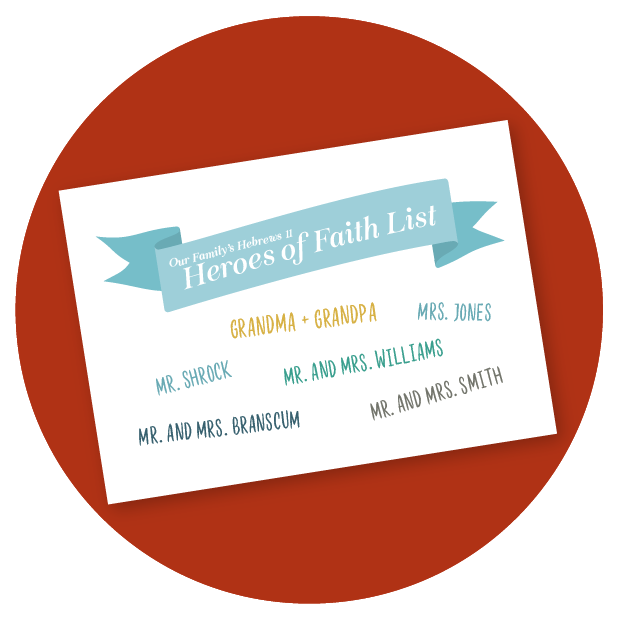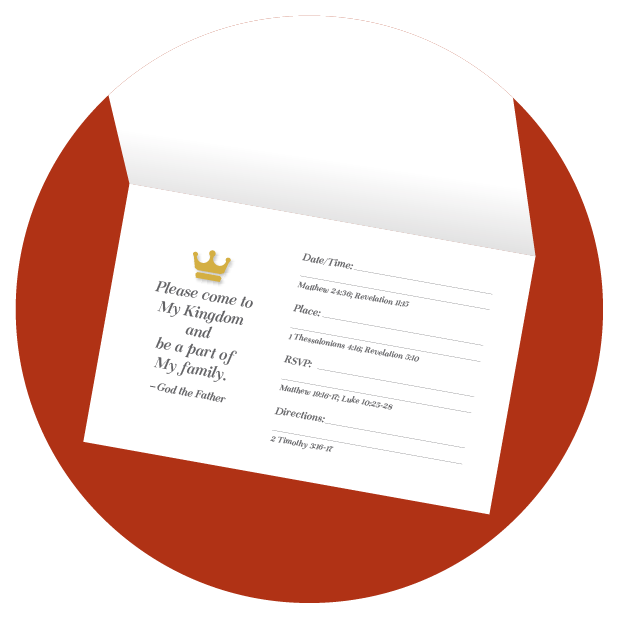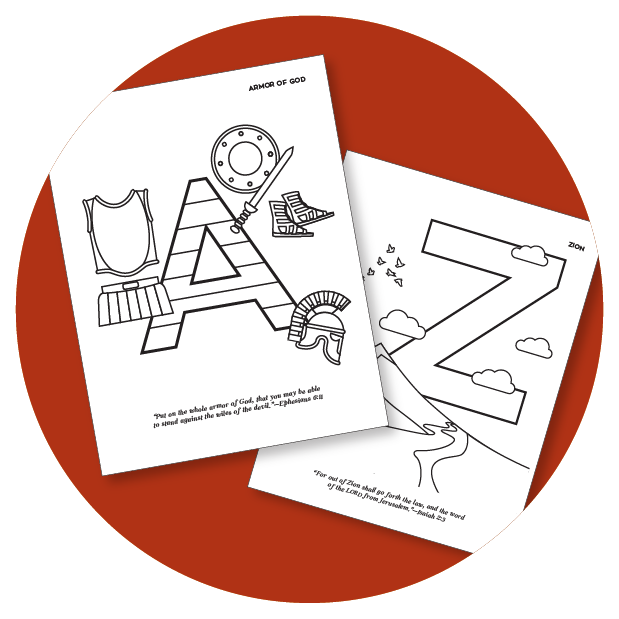Speak to the children of Israel, saying: “In the seventh month, on the first day of the month, you shall have a sabbath-rest, a memorial of blowing of trumpets, a holy convocation. You shall do no customary work on it; and you shall offer an offering made by fire to the LORD.” —Leviticus 23:24-25
For the Lord Himself will descend from heaven with a shout, with the voice of an archangel, and with the trumpet of God. And the dead in Christ will rise first. Then we who are alive and remain shall be caught up together with them in the clouds to meet the Lord in the air. And thus we shall always be with the Lord.” —1 Thessalonians 4:16-17
OBJECTIVE
To teach that the Feast of Trumpets depicts Christ’s return to earth and the first resurrection.
Note to parents
We encourage you to read through this material with your children to provide an overview of the meaning of the Feast of Trumpets and what it pictures. Then choose appropriate materials from the supplemental pages that you feel will be helpful in teaching and reinforcing the meaning of the day.
A blast of trumpets announced the high day on the first day of the seventh month—the Feast of Trumpets.
THE MEANING OF THE FESTIVAL
Beginning the third and final festival season, the Feast of Trumpets marks a significant change from the previous holy days in God’s plan of salvation. All of the previous festivals—Passover, Unleavened Bread and Pentecost—deal directly with one’s personal commitment to God’s calling, but the fall holy days focus on God’s direct intervention to restore the world and set up the Kingdom of God on earth.
The Feast of Trumpets focuses our attention on future events by looking forward to Christ’s return to earth and the resurrection of the faithful saints of God (1 Thessalonians 4:16-17). The Feast of Trumpets proclaims God’s love and concern for all of humanity by announcing that He will directly take charge by setting up His Kingdom on earth (Revelation 11:15; 19:16).
Jesus explained that humanity would be enduring great suffering—wars, famines, earthquakes and spiritual deception.
In Matthew 24, Christ’s disciples asked Him what signs would announce His return to earth—commonly referred to as His second coming. Jesus explained that humanity would be enduring great suffering—wars, famines, earthquakes and spiritual deception—that will show His return is near. Amid all this lawlessness and suffering, Jesus Christ also states that His true gospel will be preached to all nations, and “then the end will come” (verse 14).
In ancient Israel, the trumpet was an excellent instrument to use for announcing important information. Whether calling a meeting, sounding a warning or proclaiming a holy day, the sound of the trumpet demanded everyone’s attention (Numbers 10:8-10). A blast of trumpets announced the high day on the first day of the seventh month— the Feast of Trumpets (Numbers 29:1).
When the seventh and final trumpet sounds, it will proclaim Christ’s return and the resurrection of His faithful people, called saints.
In the New Testament, even more significance to the blowing of trumpets is revealed. Jesus Christ prophesied that terrible plagues, each announced by a trumpet blast, will be poured out upon humans because of their disobedience to God (Revelation 8-9). When the seventh and final trumpet sounds, it will proclaim Christ’s return and the resurrection of His faithful people, called saints (1 Corinthians 15:52).
The Feast of Trumpets teaches us that God is going to send His Son, Jesus Christ, back to the earth with great power and glory (Matthew 25:31). Jesus will take control of the earth as King so that He can bring peace, safety and happiness to the whole world. He will set up the Kingdom of God on the earth and begin to help people learn what is right and good by teaching them His law (Matthew 5:17-19).
You are being prepared to help teach others how to live at that time by learning and living the right way today.
When He returns, Christ will resurrect His faithful people who have died and make them spirit beings who will live forever (Matthew 16:27; 1 Corinthians 15:51-54). Those of God’s people who are still alive when Christ returns—true Christians who have His Holy Spirit—will be changed from physical beings into spirit beings who cannot die. This is what it means to be given eternal life (Daniel 7:18). These spirit beings will live with Jesus and help rule the world (Revelation 20:4). They will help the human beings who are still alive when Christ returns learn how to live the right way—God’s way. You are being prepared to help teach others how to live at that time by learning and living the right way today.
They will live and reign with Him on earth during the 1000-year period referred to as the Millennium.
Hebrews 11 provides a list of several of those saints who await the promise of eternal life. They committed their lives to obeying God, and He will reward them by bringing them up to spirit life to stand again in service to Christ at His return. They will live and reign with Him on earth during the 1000-year period referred to as the Millennium.
The arrival of Jesus Christ to establish the Kingdom of God will initiate the most dramatic events the world has ever known. Christ will return with power and authority! The dead in Christ will arise! The world will notice! As we faithfully keep the Feast of Trumpets, we must continue to look eagerly to Christ’s return and pray, “Your kingdom come” (Matthew 6:10).
SCRIPTURE DISCUSSION POINTS
You can use the following guided discussion topics to stimulate dialogue about the Feast of Trumpets. When reading and discussing the events surrounding the return of Christ and His taking control of the earth to set up His Kingdom, be mindful of the maturity level of your children. Young children will not necessarily need all of this information during their early years.
Feast of Trumpets observance commanded
First day of the seventh month (Leviticus 23:23-25)
- Explain the difference between the calendar we use today and the biblical calendar.
- Explain and define convocation: “a calling together; a group of people formally assembled for a special purpose.” Since this is a holy convocation under God’s authority, our presence is commanded.
- Explain and define memorial: “something designed to preserve a memory.”
- Explain that the holy day is an annual Sabbath day: we attend church services, we do not work, we rejoice, we give an offering, and so on.
- Review the three previous festivals and their meanings:
- Passover, a memorial of Christ’s sacrifice for the forgiveness of our sins
- Feast of Unleavened Bread, a seven-day festival that reminds us of our need to turn from sin and obey God’s laws
- Feast of Pentecost, a festival that reminds us of the necessity of God’s Holy Spirit for the overcoming of sin
Notice that the two silver trumpets were blown on the first day of the month.
A day of the blowing of trumpets (Numbers 29:1-6)
- Talk about how ancient Israel was to present an offering to God and how we give an offering in a different way today (Deuteronomy 16:16-17).
- Explain that trumpets were used for several different reasons within ancient Israel (Numbers 10:110; Psalm 81:3). Notice that the two silver trumpets were blown on the first day of the month. The Feast of Trumpets is the first day of the seventh month.
- Explain that often the trumpet was used to sound an alarm. Emphasize that the Feast of Trumpets pictures the beginning of a tremendous change in humanity’s history.
Hatred and lawlessness will continue to increase and intensify.
When will Christ return?
Signs of Christ’s second coming (Matthew 24:3-14)
- Explain that while war, famine, disease and earthquakes have always plagued humanity, these troubles will increase in intensity as Christ’s return nears (Luke 21:11; Revelation 16).
- Explain that hatred and lawlessness will continue to increase and intensify (Matthew 24:9-12; 2 Timothy 3:1-4).
- Explain that the gospel will be preached to the whole world (Matthew 24:14; Mark 13:10).
- Emphasize that these signs are the beginning of the difficulties that will plague humanity (Matthew 24:8).
- Read parallel accounts of Matthew 24 in Mark 13 and Luke 21.
No one knows the day or the hour (Matthew 24:36-39; Mark 13:32-33)
- Some individuals put much time into trying to figure out the day and hour when Christ will return, even though Scripture tells us this is not something we should be pursuing (Acts 1:6-7). Emphasize that God the Father is the only Being who knows exactly when He will send Jesus Christ back to this earth.
- Discuss the fact that we need to spend our time preparing ourselves spiritually rather than trying to predict Christ’s return.
- Discuss that humanity will be going about everyday life with no regard to the signs of Christ’s second coming.
All the nations of the earth will be involved in this time of disaster, famine, pestilence and war.
The day of the Lord (Joel 2:1-11)
- Explain that Scripture interprets “a day” in prophecy as a year in actual fulfillment (Numbers 14:34; Ezekiel 4:6). Isaiah 34:8 uses the phrases “the day of vengeance” and “the year of recompense” to describe this time period.
- Explain that God’s punishment is necessary to bring about humanity’s genuine repentance. Emphasize that humanity continues to reject God and His perfect ways.
- Explain that all the nations of the earth will be involved in this time of disaster, famine, pestilence and war (Zechariah 14; Revelation 16).
- Explain that Christ’s return will ultimately put an end to sin.
God’s compassion for His faithful servants will bring a halt to humanity’s inescapable destruction.
No one would survive (Matthew 24:21-22)
- Explain that the time leading up to Christ’s return will be unlike any other time in history. God’s judgment upon humanity will be severe (Daniel 12:1).
- Explain that God’s mercy is supreme (Nehemiah 9:31; James 2:13). He will not allow humanity to be completely destroyed. God’s compassion for His faithful servants will bring a halt to humanity’s inescapable destruction.
Sign of the Son of Man (Matthew 24:29-31)
- Explain that when Christ intervenes in world affairs, dramatic changes will occur to earth’s physical systems.
- Emphasize that we can trust God and not fear. If we are striving to follow Jesus Christ and maintaining a close relationship with God, we will be protected (Revelation 3:10).
Although the Feast of Trumpets is a solemn day, it is a day of rejoicing for the healing that will be delivered by our most merciful God.
Jesus Christ will reign forever (Revelation 11:15)
- Explain that Christ will return at the sound of the seventh trumpet.
- Explain that Christ’s return will usher in the fulfillment of our hope—the hope of eternal life. Although the Feast of Trumpets is a solemn day, it is a day of rejoicing for the healing that will be delivered by our most merciful God.
Mount of Olives (Zechariah 14:4, 9)
- Discuss the fact that Christ ascended into heaven from the Mount of Olives and will descend upon the Mount of Olives upon His return to earth (Acts 1:9-12).
- Locate Jerusalem and the Mount of Olives on a map.
God has determined a prescribed order of resurrections: each one will occur in the proper sequence at the proper time.
First resurrection
Each in order (1 Corinthians 15:20-23)
- Explain and define resurrection: the Greek word means “a raising up,” signifying “a return to life after death.”
- Discuss that Christ was the first to be resurrected from physical death to eternal life.
- Explain that God has determined a prescribed order of resurrections: each one will occur in the proper sequence at the proper time.
Resurrection to glory (1 Corinthians 15:42-44, 50-57)
- Explain and define these contrasting concepts: corruptible and incorruptible; mortal and immortal; physical flesh and spirit being.
- Explain that the first resurrection will occur at the sound of the seventh trumpet.
- Discuss God’s absolute power. God is capable of instantly changing a physical being into a spirit being.
- How fast is a “twinkling of an eye”?
- Explain that only spirit beings can live forever in God’s Kingdom.
Blessed and holy (Revelation 20:6)
- Explain and define holy: “set apart by God for a special purpose.”
- What things are holy to God? (Sabbath, holy days, first tithe, His people, and so on)
- Emphasize the special privilege of being holy to God.
- Explain and define eternal: “lasting forever; having no end.”
- Explain the phrase second death (Revelation 20:14).
- Why is the first resurrection called a “better resurrection”? (See Hebrews 11:35; Revelation 20:6; 22:14.)
These died in faith (Hebrews 11:13-16, 39-40)
- Explain and discuss “the promise” (verse 39).
- Choose one (or more) of the individuals listed in Hebrews 11 and read about him or her in Scripture. Discuss the challenges each faced. What can you learn from their examples?
- Have younger children illustrate a page for each of the individuals you learn about. Several pages can be combined together to make a book.
- Using a piece of poster board, make your own family’s “Heroes of Faith” list, similar to the one in Hebrews 11. Here are a few suggestions: include the names of faithful individuals that you knew from your childhood; include the names of people your children suggest; talk about and discuss the godly traits that these individuals possessed; talk about how exciting it will be to be reunited with them and all those listed in Hebrews 11. Hang the poster up where it can easily be viewed by all. (Download “Heroes of Faith” supplement.)
The dead in Christ rise first (1 Thessalonians 4:16-17)
- Emphasize that a trumpet will sound with Christ’s descent.
- Discuss that all the individuals who have remained faithful to their calling (whether dead or alive) will be resurrected or changed at the same time to become eternal spirit beings.
Stories related to the Feast of Trumpets and Christ’s return
Reformation of Israel in Nehemiah 8:1-12: After returning from captivity and rebuilding the wall, Nehemiah worked together with Ezra in leading Israel back to God. Ezra read the Book of the Law to the people on the first day of the seventh month—the Feast of Trumpets—from morning to midday.
Parable of the fig tree in Luke 21:29-36: We must be discerning the signs that reveal Christ’s return is near. Christ instructs us to pray, watch and be prepared. Parallel accounts can be found in Matthew 24:32-35 and Mark 13:28-31.
Parable of the 10 virgins in Matthew 25:1-13: This parable teaches the importance of constant readiness.
Memory Verse
Then the seventh angel sounded: And there were loud voices in heaven, saying, “The kingdoms of this world have become the kingdoms of our Lord and of His Christ, and He shall reign forever and ever!” —Revelation 11:15
Further Your Study
God’s Plan & Purpose for Humanity
Review God’s step-by-step plan of salvation for all of humanity by being reminded of the meanings and fulfillment of each of the annual festivals outlined in Leviticus 23. See how all seven festivals fit together to provide a complete Read More >
Heroes of Faith
Who inspires you from the “faith chapter,” Hebrews 11? Create this chart and add additional names of people from the Bible or faithful individuals you have known personally. Makes a great accompaniment to our “Feast of Trumpets” Read More >
Components of a Kingdom
A kingdom needs: a ruler, a territory, laws, and citizens. Use this fill-in chart to discuss these concepts and reflect on their significance with your children. Makes a great accompaniment to our “Feast of Tabernacles” lesson. Read More >
Three Resurrections
Use this fill-in chart to study and discuss the resurrections recorded in Scripture. Makes a great accompaniment to our “Last Great Day” lesson. Read More >
By Invitation Only
Print this file on card stock to create your own festival card designed to look like a special invitation from God the Father to become a part of His Kingdom. Makes a great Feast of Tabernacles activity for your children. Read More >
A to Z Bible Coloring Pages
A is for Armor of God. B is for Bible. C is for Creation. Enjoy our coloring pages featuring biblical concepts or people in the Bible for each letter of the alphabet. Read More >




